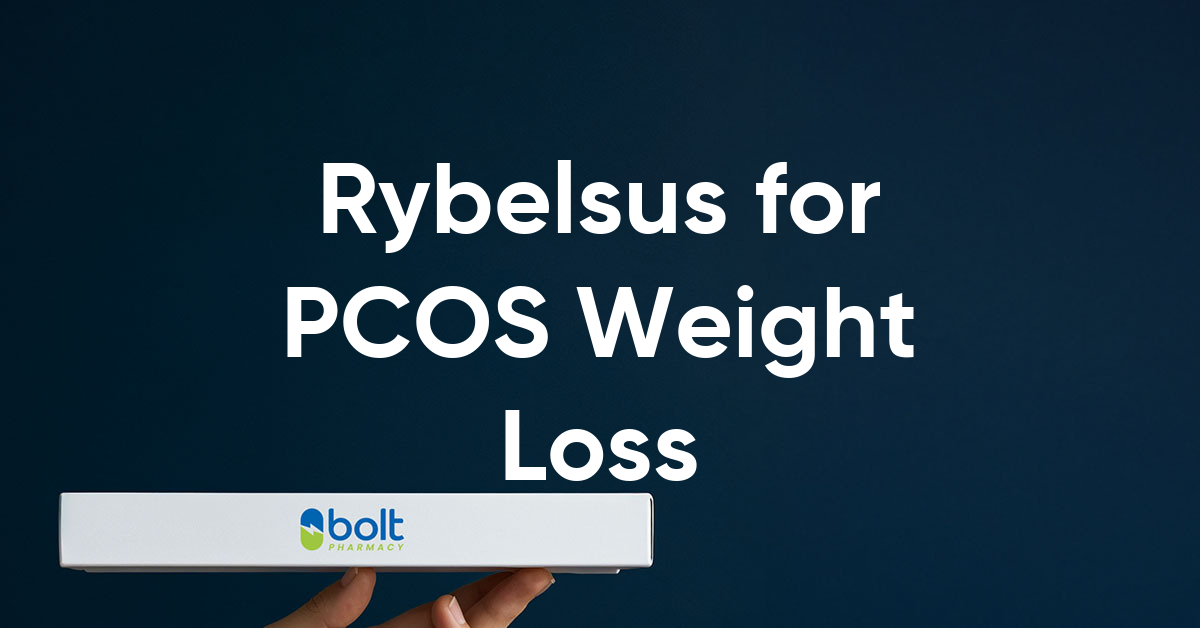Rybelsus (semaglutide) is an oral medication licensed in the UK for type 2 diabetes, but many women with polycystic ovary syndrome (PCOS) wonder whether it might help with weight management. PCOS affects up to 10% of women of reproductive age and is frequently associated with insulin resistance and difficulty losing weight. Whilst GLP-1 receptor agonists like Rybelsus show promise in early research, it is important to understand that this medication is not currently licensed or routinely recommended by NICE for PCOS or weight loss in this population. This article explores the evidence, NHS treatment options, and what women with PCOS should consider.
Summary: Rybelsus is not licensed in the UK for PCOS or weight loss, though emerging research suggests GLP-1 receptor agonists may offer metabolic benefits in women with polycystic ovary syndrome.
- Rybelsus (semaglutide) is a GLP-1 receptor agonist licensed only for type 2 diabetes treatment in the UK.
- PCOS affects 5–10% of UK women and is commonly associated with insulin resistance and weight management difficulties.
- Small studies suggest GLP-1 agonists may improve weight, insulin sensitivity, and hormonal parameters in PCOS, but evidence remains limited.
- Common side effects include nausea, vomiting, and gastrointestinal symptoms; serious risks include pancreatitis and gallbladder disease.
- NHS first-line treatment for PCOS weight management includes lifestyle modification, with metformin or orlistat as pharmacological options.
- Any off-label use of Rybelsus for PCOS requires specialist assessment, monitoring, and discussion of risks versus benefits.
Table of Contents
What Is Rybelsus and How Does It Work?
Rybelsus (semaglutide) is an oral medication licensed in the UK by the Medicines and Healthcare products Regulatory Agency (MHRA) for the treatment of type 2 diabetes mellitus as an adjunct to diet and exercise. It belongs to a class of drugs known as glucagon-like peptide-1 (GLP-1) receptor agonists. Unlike injectable formulations of semaglutide (such as Ozempic or Wegovy), Rybelsus is taken as a once-daily tablet, making it a convenient option for patients who prefer oral therapy.
The mechanism of action centres on mimicking the naturally occurring hormone GLP-1, which is released by the gut in response to food intake. Semaglutide works by:
-
Enhancing insulin secretion from the pancreas in a glucose-dependent manner, which helps lower blood sugar levels without causing excessive hypoglycaemia
-
Suppressing glucagon release, thereby reducing glucose production by the liver
-
Slowing gastric emptying, which prolongs the feeling of fullness after meals
-
Acting on appetite centres in the brain, leading to reduced hunger and caloric intake
These combined effects not only improve glycaemic control in people with type 2 diabetes but also frequently result in weight loss as a secondary benefit. In the PIONEER clinical trials, patients taking Rybelsus experienced modest weight reductions compared to placebo. This has generated interest in its potential use for weight management in other conditions associated with insulin resistance and obesity, including polycystic ovary syndrome (PCOS).
It is important to note that Rybelsus is not currently licensed in the UK for weight loss or for the treatment of PCOS. The starting dose is 3 mg once daily for 30 days, followed by 7 mg once daily, with a possible increase to 14 mg if needed. It must be taken on an empty stomach with a small amount of water (no more than 120 ml), at least 30 minutes before eating, drinking, or taking other oral medicines. When used with sulfonylureas or insulin, dose reductions of these medications may be needed to reduce the risk of hypoglycaemia.
PCOS, Weight Gain and Insulin Resistance: The Connection
Polycystic ovary syndrome (PCOS) is one of the most common endocrine disorders affecting women of reproductive age, with an estimated prevalence of 5–10% in the UK according to NHS data. The condition is diagnosed using the Rotterdam criteria, which require at least two of the following: irregular menstrual cycles, clinical or biochemical hyperandrogenism (elevated male hormones), and polycystic ovaries visible on ultrasound. Many women with PCOS also struggle with weight gain and find it particularly difficult to lose weight through diet and exercise alone.
A key underlying factor in PCOS is insulin resistance, which affects approximately 50–70% of women with the condition, regardless of body weight. Insulin resistance occurs when the body's cells become less responsive to insulin, prompting the pancreas to produce more insulin to maintain normal blood glucose levels. This state of hyperinsulinaemia (elevated insulin levels) has several detrimental effects:
-
It stimulates the ovaries to produce excess androgens (male hormones such as testosterone)
-
It promotes fat storage, particularly around the abdomen
-
It makes weight loss more challenging
-
It increases the risk of developing type 2 diabetes and cardiovascular disease
The relationship between PCOS and weight is bidirectional: excess weight worsens insulin resistance, which in turn exacerbates PCOS symptoms, creating a difficult cycle to break. Research has consistently shown that even modest weight loss of 5–10% of body weight can significantly improve insulin sensitivity, restore more regular menstrual cycles, reduce androgen levels, and enhance fertility outcomes in women with PCOS.
Women with suspected PCOS should have thyroid function, prolactin levels and other tests to exclude conditions with similar symptoms. Those with PCOS should also have regular monitoring of blood pressure, lipids, and glycaemic status (HbA1c or glucose tolerance testing based on risk factors) to assess metabolic health. Rapid-onset virilisation or very high androgen levels require urgent specialist referral to exclude androgen-secreting tumours.
NHS Treatment Options for PCOS Weight Management
The NICE Clinical Knowledge Summary (CKS) and international guidelines provide recommendations on the management of PCOS, with lifestyle modification forming the foundation of treatment. The NHS approach to PCOS-related weight management is multifaceted and typically includes:
Lifestyle interventions are always the first-line recommendation. Women are advised to:
-
Follow a balanced diet creating a sustainable energy deficit, with emphasis on healthy eating patterns that help stabilise blood sugar levels
-
Engage in regular physical activity (at least 150 minutes of moderate-intensity exercise per week, in line with UK Chief Medical Officers' guidelines)
-
Access specialist dietetic support where available, particularly for those struggling with weight loss
-
Consider behavioural therapy or weight management programmes to address psychological aspects of eating and lifestyle change
Pharmacological options may be considered when lifestyle measures alone are insufficient:
-
Metformin is commonly prescribed off-label for PCOS, particularly in women with insulin resistance or impaired glucose tolerance. It improves insulin sensitivity and may facilitate modest weight loss (typically 2–3 kg), though it is not licensed specifically for weight reduction
-
Orlistat may be offered to women with a BMI ≥30 kg/m² (or ≥28 kg/m² with comorbidities) as an adjunct to diet and exercise. This medication works by reducing fat absorption from the gut
-
Combined oral contraceptive pills help regulate menstrual cycles and reduce androgen levels but do not directly address weight or insulin resistance
-
Semaglutide (Wegovy) injections may be available through specialist weight management services for people with a BMI of at least 35 kg/m² (or ≥30 kg/m² with weight-related comorbidities) under NICE TA875, though not specifically for PCOS
For women with severe obesity (BMI ≥40 kg/m² or ≥35 kg/m² with significant comorbidities), bariatric surgery may be considered following specialist assessment, with lower BMI thresholds for some ethnic groups at higher metabolic risk. The NHS provides access to tier 3 weight management services in some areas, offering intensive multidisciplinary support.
Referral to endocrinology or gynaecology specialists may be appropriate for diagnostic uncertainty, severe symptoms, or fertility issues. It is essential that women with PCOS receive individualised care that addresses their specific symptoms, metabolic profile, and reproductive goals.
Can Rybelsus Help with Weight Loss in PCOS?
While the potential benefits of GLP-1 receptor agonists for PCOS-related weight loss are biologically plausible, it is crucial to understand that there is currently no official licence or NICE recommendation for using Rybelsus specifically for PCOS or weight management in this population. The medication is approved solely for type 2 diabetes treatment in the UK.
That said, emerging research has explored the use of GLP-1 agonists in women with PCOS. Several small studies have suggested that these medications may offer benefits beyond glycaemic control:
-
Weight reduction: Clinical trials of injectable GLP-1 agonists (primarily liraglutide) in women with PCOS have shown greater weight loss compared to metformin or placebo, with some studies reporting average losses of 5–10% of body weight
-
Improved insulin sensitivity: By enhancing the body's response to insulin, these drugs may help address one of the core metabolic abnormalities in PCOS
-
Hormonal improvements: Some research indicates potential benefits for menstrual regularity and androgen levels, though evidence remains limited
However, several important caveats apply:
-
Most studies have been small-scale and short-term, with limited long-term safety and efficacy data in PCOS populations
-
Common side effects of Rybelsus include nausea, vomiting, diarrhoea, and abdominal discomfort, which can be significant enough to cause treatment discontinuation
-
Serious side effects can include pancreatitis (seek urgent medical attention for severe, persistent abdominal pain), gallbladder disease, and worsening of diabetic retinopathy in people with diabetes
-
The medication is expensive and unlikely to be routinely funded by the NHS for off-label PCOS treatment
-
Pregnancy and contraception: Rybelsus should be discontinued at least 2 months before a planned pregnancy and is not recommended during pregnancy or breastfeeding. Effective contraception is advised during treatment
If you have PCOS and are struggling with weight management, it is essential to discuss all available options with your GP or specialist. They can assess whether you might benefit from established treatments like metformin, refer you to appropriate weight management services, or consider whether off-label use of newer medications might be appropriate in your individual circumstances. Any decision to use Rybelsus should be made collaboratively with a healthcare professional who can monitor for both benefits and potential adverse effects.
If you experience side effects from any medication, report them to the MHRA Yellow Card Scheme (yellowcard.mhra.gov.uk or via the Yellow Card app).
Frequently Asked Questions
Is Rybelsus approved for weight loss in PCOS?
No, Rybelsus is not licensed in the UK for PCOS or weight management. It is approved only for type 2 diabetes treatment, though some specialists may consider off-label use in selected cases with careful monitoring.
What are the NHS-recommended treatments for PCOS weight management?
The NHS recommends lifestyle modification as first-line treatment, including diet, exercise, and behavioural support. Pharmacological options include metformin (off-label) for insulin resistance and orlistat for weight management in those with elevated BMI.
What side effects should I watch for with Rybelsus?
Common side effects include nausea, vomiting, diarrhoea, and abdominal discomfort. Seek urgent medical attention for severe, persistent abdominal pain, which may indicate pancreatitis, and report all side effects via the MHRA Yellow Card Scheme.
The health-related content published on this site is based on credible scientific sources and is periodically reviewed to ensure accuracy and relevance. Although we aim to reflect the most current medical knowledge, the material is meant for general education and awareness only.
The information on this site is not a substitute for professional medical advice. For any health concerns, please speak with a qualified medical professional. By using this information, you acknowledge responsibility for any decisions made and understand we are not liable for any consequences that may result.
Heading 1
Heading 2
Heading 3
Heading 4
Heading 5
Heading 6
Lorem ipsum dolor sit amet, consectetur adipiscing elit, sed do eiusmod tempor incididunt ut labore et dolore magna aliqua. Ut enim ad minim veniam, quis nostrud exercitation ullamco laboris nisi ut aliquip ex ea commodo consequat. Duis aute irure dolor in reprehenderit in voluptate velit esse cillum dolore eu fugiat nulla pariatur.
Block quote
Ordered list
- Item 1
- Item 2
- Item 3
Unordered list
- Item A
- Item B
- Item C
Bold text
Emphasis
Superscript
Subscript












